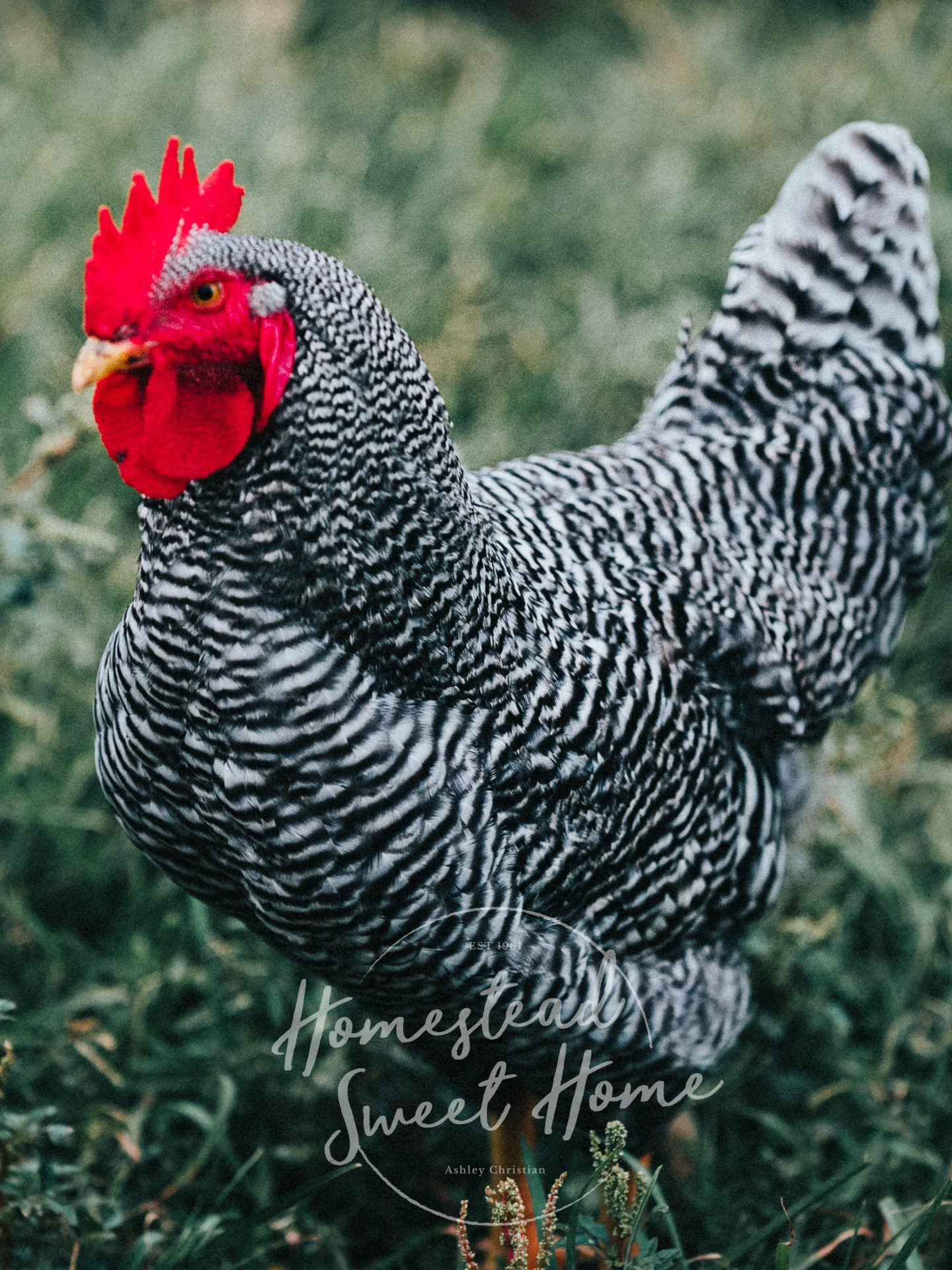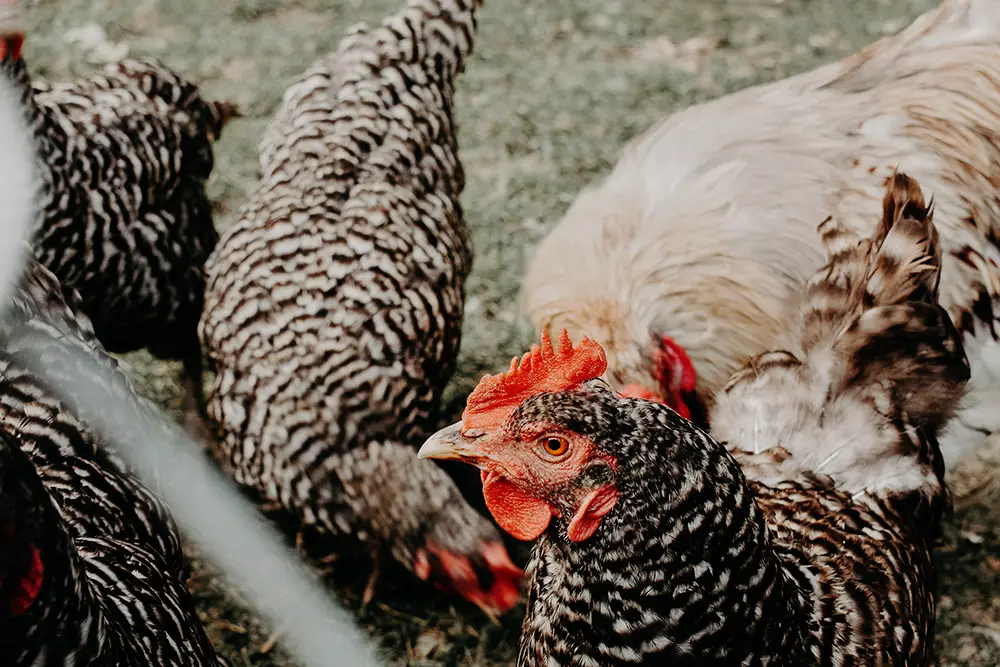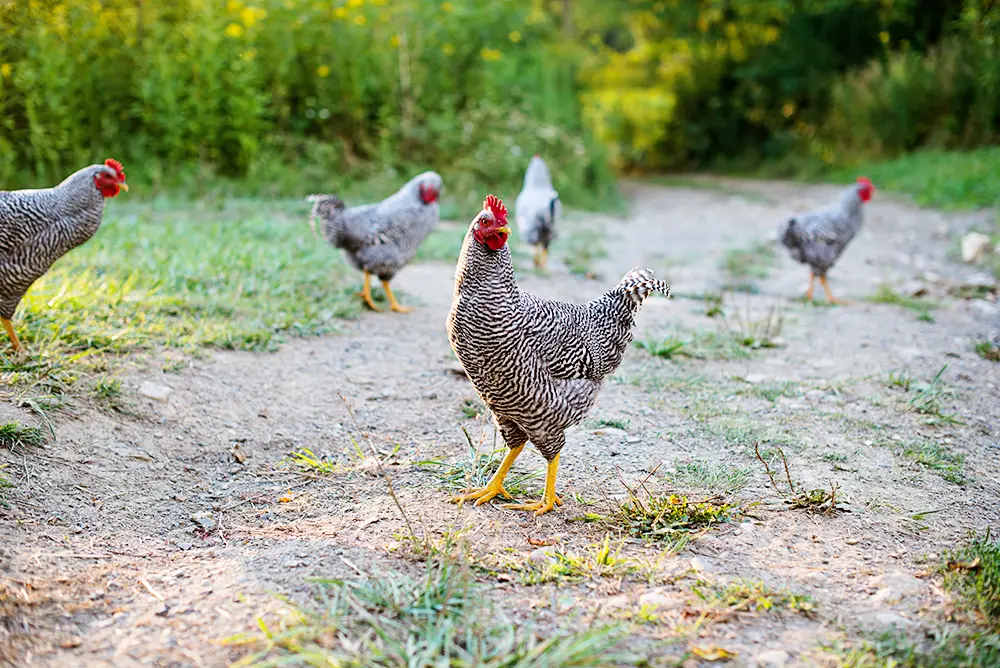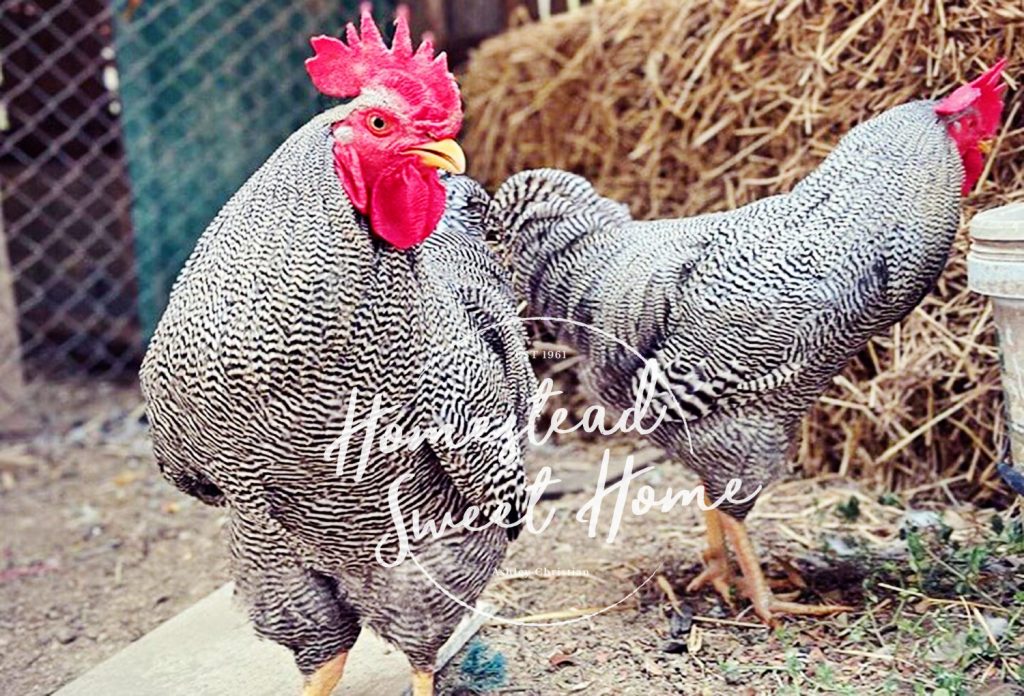Barred Plymouth Rock Chickens – A Perfect Choice for Backyard Farms

Plymouth Rock Chickens (also known as Barred Rock) Quick Facts
- Known for: the all-time favorite dual-purpose breed of chicken in America, reliable and prolific egg-layer, even through winter, and makes a great meat bird
- Temperament: friendly, docile, handles confinement well
- Eggs: 200 medium brown eggs each year
- Meat: excellent—reaches maturity at 20 weeks with 9.5 lb males and 7.5 lb females
- Climate: good heat tolerance and excellent cold tolerance, will continue laying through winter
- Broodiness: may sit on their eggs
Plymouth Rock Chicken Overview
Originally developed in New England in the 1800s, the Plymouth Rock chicken is an all-time American favorite breed due to its excellent egg-laying and meat-producing abilities, and its friendly disposition.
At the end of World War II, the Plymouth Rock chicken became America’s main source of chicken. Today’s commercial chickens are descended from a White Cornish and a Plymouth Rock chicken.
Even though her egg production declines after year three, a Plymouth Rock chicken can lay eggs for an incredible 10 years! They are great with families and children, love to free-range, and are always curious. Though they aren’t a particularly broody breed, when they do decide to hatch eggs they make excellent mothers.
Pros and Cons of Plymouth Rock Chickens
- Pros: excellent dual-purpose breed for both eggs and meat, very friendly with their owners and children, handles confinement well, quiet, and easy to sex at a young age
- Cons: Not as smart as other breeds, can be a little shy, can be easy prey for predators, flighty
Plymouth Rock Chicken Appearance
- Size: large-sized birds 7.5 lb females and 9.5 lb males
- Colors: barred, blue, buff, Columbian, partridge, silver pencil, and white varieties
- Egg Color: Plymouth Rock chicken eggs are brown in color
Though the Plymouth Rock Chicken comes in a variety of colors, the Barred Rock chicken is the most famous, with a distinct black and white barred pattern. They have full, loose, soft feathers with a red comb, wattle, and ear lobes, and yellow skin and feet.
Plymouth Rock chickens can be sexed at hatching with about 80% accuracy which is helpful if you plan to raise the males on higher protein feed as meat birds. Male Plymouth Rock chicks will have a large white spot on the top of their head, while the female’s white spot will be much smaller.

Plymouth Rock Chicken Egg Production
Plymouth rock (or barred rock) chickens are excellent prolific egg layers and will lay about 200 eggs per year. They are also very winter hardy with their full plumage and will usually continue to lay through the cold winter months.
A Plymouth Rock’s egg production is best in her first three years of life, then it slowly starts to decline as she ages. A hen can continue laying for up to an amazing ten years.
Their brown eggs size ranges from medium to large. Hens will reach full maturity at 20 weeks, and they should start laying shortly after. To keep your birds healthy and productive, keep their coop and run clean. You can also give them a separate bowl of oyster shells or crushed eggshells to consume as desired. These supplements will provide the extra calcium they require to lay eggs as well as possible.
Plymouth Rock Chicken Meat Production
The Plymouth Rock is excellent meat-producing chicken and was used almost exclusively for chicken meat in America prior to World War II. Interestingly, the US government encouraged their breeding to help offset war rations.
You can process Plymouth Rock chickens at around 20 weeks and get around 3 pounds of dressed meat off of them. You can also let them continue growing to get the most meat possible and butcher at 7 to 8 months old. If you are using Plymouth Rocks for meat chickens, do keep in mind their feed costs and factor that into your cost and the timing of harvesting your chicken. After around 9 to 10 months, your chickens will become less tender and will be best used to stew meat or chicken stock.
Plymouth Rock Chicken Broodiness
A Plymouth Rock, or Barred Rock hen may take a very long while to go broody and set on a clutch of eggs. But once they do go broody, they are extremely determined mothers and excellent brooders. If you want to hatch fertilized Plymouth Rock chicken eggs yourself, you can purchase an incubator that automatically turns your eggs, and controls the temperature and some models even control the humidity.
Because the Plymouth Rock does not go broody very often, this helps booster her egg production, since broody hens stop laying eggs. If your hen does go broody and hatch a clutch of eggs, you won’t have to worry about her chicks, as she will be an excellent mother.
Plymouth Rock Chicken Temperament
Plymouth Rock chickens are calm, docile, and easy to handle. They are friendly and will follow you around and softly talk to you. They also love to sit in your lap, especially when handled often as chicks. Plymouth rocks generally get along well with other chickens, though their sometimes shy personality can lead them to be lower on the pecking order.
Their calm personalities help them tolerate confinement well, though they do like to forage. However, they are not particularly bright birds and not good at keeping an eye out for predators. So if you do let them free-range, make sure they are protected by a more aggressive rooster like a Rhode Island Red, or a livestock guardian like a donkey, alpaca, or trained guardian dog.
Even though they are known for their calm personalities, they can also be a little goofy and fun to watch. They are wonderful with children and love to be petted. Plymouth Rock chickens would be an excellent choice for new chicken owners and families.

Plymouth Rock Chicken Noise Level
Thankfully Plymouth Rock or Barred Rock chickens are fairly quiet, yet talkative, so they would make a good choice in a neighborhood or small backyard farm. When they do make sounds, it’s a gentle egg song or a predator alert.
Plymouth Rock Chicken Care
Luckily the Plymouth Rocks are hardy and healthy chickens with relatively few health problems requiring extra care. When they do need special care, it can be for frostbite of the rooster’s large wattles in bitterly cold areas. Other than that they have a great gene pool and can live up to 10 to 12 years.
You will want to keep the coop and run clean and free of manure build-up and soiled bedding. Get your chicks vaccinated or use medicated chick starter, and put a few teaspoons of apple cider vinegar in their plastic waterer to boost their immune systems.
Plymouth Rock chickens are very cold-hardy, but you can take a few extra steps to keep them comfortable in the summer if you live in a warm climate. Make sure they have areas of shade, the coop has plenty of ventilation, and you can even provide a kiddie pool of water they can walk in to cool off.
To learn more about how to take care of your Plymouth Rock chickens, read our Ultimate Guide to Taking Care of Chickens.
Plymouth Rock Chicken Housing
Plymouth Rock chickens need four square feet each inside their coop, and fifteen square feet each in their run.
Provide a roost in the coop for your chickens at night as Plymouth Rocks are flighty birds and will love to roost up high. Your hens will need about one nesting box for every three hens so they don’t get too crowded and their nesting boxes should be about 12×12.
Because Plymouth Rocks are not particularly bright or alert to predators, and because they handle confinement well, it may be best to keep them in a large enclosed run. The Barred Rock variety’s coloring helps them camouflage from aerial predators.
Feeding Plymouth Rock Chickens
Plymouth Rock chickens can be given standard chick starter from hatching till they reach maturity around 20 weeks. Layer feed contains 16% protein and added calcium to keep their eggshells healthy and strong. Roosters can eat the same feed as the hens.
You may give your Plymouth Rock chickens as much free-roaming space to eat plants and bugs as you can provide. They’ll also enjoy kitchen scraps (though there are some that are harmful, so avoid avocados, dried beans, junk or rotten food, green potato skins, citrus, onions, or tomato or potato leaves from the garden.) Giving them this variety will not only help you save money on their large feed requirements but will also keep them healthy and entertained.
Offering Plymouth Rock chickens grit is important for their health. Since chickens don’t have teeth, they need fine gravel or coarse sand in their gizzards to digest their food. Free-range chickens can usually naturally find this, but if your Plymouth Rock chickens don’t have access to pebbles, sand, or fine gravel, you’ll want to offer some supplemental grit.
Chicken scratch is also an important supplement to offer to Plymouth Rock chickens who are confined to a run or small space. Scratch is a mixture of whole grains that stimulates pecking and scratching behaviors which are soothing to chickens.
Chicken Treats: You don’t HAVE to give your Plymouth Rock chickens treats, but it’s a lot of fun! Mealworm and black soldier fly larva treats are excellent snacks for chickens that you can get from the feed store.
What is it like to own a Plymouth Rock Chicken?
Plymouth Rock chickens have many excellent practical features. They are excellent egg layers, even through the winter. And they make good dual-purpose meat birds. They are easy to sex at hatching if you want to cull roosters from the flock with separate broiler feed. They don’t wander too far from the coop and are quick to come back before dusk. The roosters are also good protectors of the hens.
Plymouth Rock chickens have an excellent temperament and are often the favorite breed of the flock. They are talkative but the sound is soft so it won’t both the neighbors if you live close by. They love to follow you around the yard and be held, so they make great pets for children and families.
They can be a little skittish and shy sometimes. That combined with their docile nature can make them targets for being bullied by more aggressive breeds. Though some chicken farmers have reported their Plymouth Rocks can be bullies to other birds. A lot depends on their place in the pecking order and if they were raised as chicks with the other birds.
Plymouth Rock Chicken Breed History
The Plymouth Rock chicken is one of the oldest heritage breeds in America and is named after the famous first landing place of the Pilgrims. The Plymouth Rock was first seen in Massachusetts in the mid-1800s.
The Plymouth Rock is a mix of the Asian Java chicken and the Europen Dominique chicken. The Plymouth Rock became the most popular chicken breed in American from the late 1800s through World War II.
The Plymouth Rock was used in the development of commercial broiler chickens like the Cornish X Rock. Since these hybrid chickens have been widely used in the past 60 years, the Plymouth Rock chicken has plummeted in popularity but is still a favorite of many small farmers across the country.
Summary
The Plymouth Rock chicken is an incredibly reliable heritage chicken that is an excellent egg layer and good meat bird. They do well in cold weather and many will lay even through the winter. They don’t often go broody, but when they do, they make excellent mothers.
If you’re looking for a dependable, hardy, all-around chicken that is friendly, calm, quiet and handles containment well, you will do very well with the Plymouth Rock chicken. It is a great choice for the backyard farmer and those in neighborhoods because it is quiet, does well with containment, and is friendly and easy to care for.
Do you own Plymouth Rock or Barred Rock chickens? Let us know in the comments below what your experience has been.


5 Comments
I’m looking to purchase 2 chickens for eggs. Will Plymouth rock and Rhode island reds get along well? I live in the city and their run will be about 18 sq feet but I could add a wire tube run (not sure if that’s what it’s called). Advise?
Deanna
Hi Deanna,
Congratulations on your new adventure with backyard chickens! The Barred Rock and Rhode Island Red are both very good choices and should get along just fine, especially if they are raised together. Even if they aren’t raised together, they are two breeds that usually do just fine together. Both are friendly, though the Rhode Island Red roosters can get mean and territorial after about 6 to 8 months of age. 18 square feet is plenty of space for two chickens, so you don’t need to add a tunnel run if you don’t want to. Please let me know if you have any more questions, and I encourage you to read my guide to raising chickens here: https://homesteadsweethome.com/how-to-take-care-of-chickens/
Blessings,
Ashley
Im new raising the plymouth rock and rhode island red.
Im new raising the plymouth rock and rhode island red.Just want to know more about these chickens.
We have 8 Barred Plymouth Rock birds one is our rooster. We also have two Buff Orpington hens, one Colombian Wyandot and four red hens from TSC. The Barred Rock rooster is out of a heritage bread rooster and hatched naturally on our farm. I’m thinking of getting 6 more Barred Rock hens heritage bread. My Barred Rocks are totally consistent and docile. I’d recommend them to anyone. I live in South Carolina and they seem to handle the heat well. Consistent egg layers right through winter.